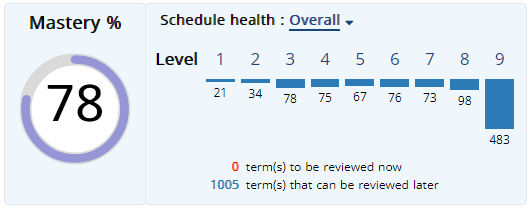掲示板 Forums - 救い、ください! How do starts work???
Top > renshuu.org > Questions about renshuu Getting the posts
Top > renshuu.org > Questions about renshuu
How do I increase mastery?
Is it by learning new things, because focused review doesn't seem to increase it?
Or some other method?
ありがとう!
Renshuu's schedules are a Spaced-Repetition System, meaning that it spaces apart questions about a given term in progressively longer intervals the more comfortable you get with it, in order to move it from your short-term memory to your long-term memory.
Mastery is a representation of how long the study interval is between questions, and only changes when you answer a question at that scheduled time for that term. If you answer correctly the mastery for that question type for that term will go up a level, if you answer incorrectly it will go down.
Because mastery is a measure of how far a term has been pushed into your long-term memory, it is not affected by study activities that trap it in your short-term memory like cramming (which is what focussed review is).
Thank you very much!
Another question, sorry, but what is a good goal for mastery? Also, is there mastery for schedules, or only stuff like Hira, kata, kanji, etc.?
Mastery is attached to individual study vectors (question types like Meaning→Japanese, Kana→Kanji, etc.) for individual terms (any word, kanji, grammar point, or sentence), so every term you study has multiple mastery levels. Mastery is not tracked on a whole-schedule level, but if you click on the title of your schedule on the dashboard, you can see graph with an overview of the mastery distribution of the terms you have studied in it so far, and an average percentage.

You can click the "Overall" dropdown, which shows the lowest mastery level for each term across all enabled study vectors, to check your mastery levels across individual vectors.
As for goals, that's up to you and how confident you feel with the material. Level 9 is the maximum, and when a term reaches that point it will be tested about every 8 months without increasing the interval any further (it takes around 9 months minimum to get a term to level 9, if you answer correctly every time). You can remove things from your study any time before that point if you don't want to review them anymore, or you can just leave things as they are and review them forever. You can also re-add something you've removed at any time, without losing your mastery levels.
Try not to fixate too much on numbers. It's more effective to just check in with yourself now and then and ask if the material you're currently reviewing is still serving you, and if you want to keep reviewing that material. What gives you the motivation to study regularly and your own confidence in what you've learned are much better metrics to use in terms of long-term-sustainable study than a percentage in a system.
Mastery is attached to individual study vectors (question types like Meaning→Japanese, Kana→Kanji, etc.) for individual terms (any word, kanji, grammar point, or sentence), so every term you study has multiple mastery levels. Mastery is not tracked on a whole-schedule level, but if you click on the title of your schedule on the dashboard, you can see graph with an overview of the mastery distribution of the terms you have studied in it so far, and an average percentage.

You can click the "Overall" dropdown, which shows the lowest mastery level for each term across all enabled study vectors, to check your mastery levels across individual vectors.
As for goals, that's up to you and how confident you feel with the material. Level 9 is the maximum, and when a term reaches that point it will be tested about every 8 months without increasing the interval any further (it takes around 9 months minimum to get a term to level 9, if you answer correctly every time). You can remove things from your study any time before that point if you don't want to review them anymore, or you can just leave things as they are and review them forever. You can also re-add something you've removed at any time, without losing your mastery levels.
Try not to fixate too much on numbers. It's more effective to just check in with yourself now and then and ask if the material you're currently reviewing is still serving you, and if you want to keep reviewing that material. What gives you the motivation to study regularly and your own confidence in what you've learned are much better metrics to use in terms of long-term-sustainable study than a percentage in a system.
ありがとう!